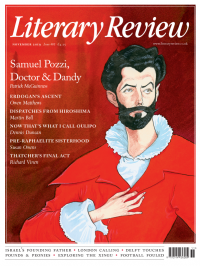Tanya Harrod
Fear & Loathing in the Studio
The Lives of Lucian Freud: Youth – 1922–1968
By William Feaver
Bloomsbury 680pp £35
‘Too complicated and private’ was the art historian and curator Catherine Lampert’s verdict on Lucian Freud’s life, predicting that it would ‘defy the psychoanalytic scope of modern biography’. She was writing in 2007 and is now working on a catalogue raisonné of Freud’s work. Lampert was stating what was generally believed: that Freud’s personal life was off limits. ‘If I talk too much it sickens me,’ he once said. Now we have William Feaver’s The Lives of Lucian Freud, the first volume of which takes us up to the late 1960s. It sets out the ‘complicated and private’ in detail and is dominated by the voice of Freud, who talks in an unbuttoned fashion. In large part based on conversations Feaver conducted with Freud from the 1970s until the painter’s death in 2011, his book is one of the most intimate biographies of an artist ever written. Not that there is huge competition, for visual artists have ways of protecting themselves. Tell-all biographies like Arianna Huffington’s Picasso: Creator and Destroyer or Sarah Jane Checkland’s Ben Nicholson: The Vicious Circles of His Life and Art tend to be vulgarisations, full of unearned intimacy, in which the writer finds his or her subject flawed, usually morally.
But if Feaver’s book gets behind Freud’s legendary wall of privacy, presenting an oral history at the artist’s instigation, it is not a vulgarisation. His biography is full of pithy observations, with just enough historical and social background to open up individual paintings and drawings to analysis. Bypassing moral

Sign Up to our newsletter
Receive free articles, highlights from the archive, news, details of prizes, and much more.@Lit_Review
Follow Literary Review on Twitter
Twitter Feed
Under its longest-serving editor, Graydon Carter, Vanity Fair was that rare thing – a New York society magazine that published serious journalism.
@PeterPeteryork looks at what Carter got right.
Peter York - Deluxe Editions
Peter York: Deluxe Editions - When the Going Was Good: An Editor’s Adventures During the Last Golden Age of Magazines by Graydon Carter
literaryreview.co.uk
Henry James returned to America in 1904 with three objectives: to see his brother William, to deliver a series of lectures on Balzac, and to gather material for a pair of books about modern America.
Peter Rose follows James out west.
Peter Rose - The Restless Analyst
Peter Rose: The Restless Analyst - Henry James Comes Home: Rediscovering America in the Gilded Age by Peter Brooks...
literaryreview.co.uk
Vladimir Putin served his apprenticeship in the KGB toward the end of the Cold War, a period during which Western societies were infiltrated by so-called 'illegals'.
Piers Brendon examines how the culture of Soviet spycraft shaped his thinking.
Piers Brendon - Tinker, Tailor, Sleeper, Troll
Piers Brendon: Tinker, Tailor, Sleeper, Troll - The Illegals: Russia’s Most Audacious Spies and the Plot to Infiltrate the West by Shaun Walker
literaryreview.co.uk